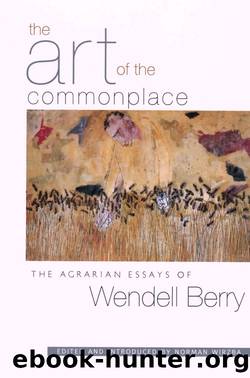The Art of the Commonplace: The Agrarian Essays of Wendell Berry by Berry Wendell

Author:Berry, Wendell [Berry, Wendell]
Language: eng
Format: epub, pdf
ISBN: 1582431469
Publisher: PGW - A
Published: 2013-07-04T04:00:00+00:00
âIt all turns on affection now,â said Margaret.
âAffection. Donât you see?â
E M. Forster, Howards End
From Sex, Economy,
Freedom, and
Community
III
Much of the modern assault on community life has been conducted within the justification and protection of the idea of freedom. Thus, it is necessary to try to see how the themes of freedom and community have intersected.
The idea of freedom, as Americans understand it, owes its existence to the inevitability that people will disagree. It is a way of guaranteeing to individuals and to political bodies the right to be different from one another. A specifically American freedom began with our wish to assert our differences from England, and its principles were then worked out in the effort to deal with differences among the states. The result is the Bill of Rights, of which the cornerstone is the freedom of speech. This freedom is not only the basic guarantee of political liberty but it also obligates public officials and private citizens alike to acknowledge the inherent dignity and worth of individual people. It exists only as an absolute; if it can be infringed at all, then probably it can be destroyed entirely.
But if it is an absolute, it is a peculiar and troubling one. It is not an absolute in the sense that a law of nature is. It is not absolute even as the moral law is. One person alone can uphold the moral law, but one person alone cannot uphold the freedom of speech. The freedom of speech is a public absolute, and it can remain absolute only so long as a sufficient segment of the public believes that it is and consents to uphold it. It is an absolute that can be destroyed by public opinion. This is where the danger lies. If this freedom is abused and if a sufficient segment of the public becomes sufficiently resentful of the abuses, then the freedom will be revoked. It is a freedom, therefore, that depends directly on responsibility. And so the First Amendment alone is not a sufficient guarantee of the freedom of speech.
As we now speak of it, freedom is almost always understood as a public idea having to do with the liberties of individuals. The public dialogue about freedom almost always has to do with the efforts of one group or another to wrest these individual liberties from the government or to protect them from another group. In this situation, it is inevitable that freedom will be understood as an issue of power. This is perhaps as necessary as it is unavoidable. But power is not the only issue related to freedom.
From another point of view, not necessarily incompatible, freedom has long been understood as the consequence of knowing the truth. When Jesus said to his followers, âYe shall know the truth, and the truth shall make you free,â he was not talking primarily about politics, but the political applicability of the statement has been obvious for a long time, especially to advocates of democracy. According to this
Download
The Art of the Commonplace: The Agrarian Essays of Wendell Berry by Berry Wendell.pdf
This site does not store any files on its server. We only index and link to content provided by other sites. Please contact the content providers to delete copyright contents if any and email us, we'll remove relevant links or contents immediately.
The Rules Do Not Apply by Ariel Levy(3898)
Bluets by Maggie Nelson(3705)
Too Much and Not the Mood by Durga Chew-Bose(3690)
Pre-Suasion: A Revolutionary Way to Influence and Persuade by Robert Cialdini(3404)
The Motorcycle Diaries by Ernesto Che Guevara(3326)
Walking by Henry David Thoreau(3228)
What If This Were Enough? by Heather Havrilesky(2943)
The Day I Stopped Drinking Milk by Sudha Murty(2852)
Schaum's Quick Guide to Writing Great Short Stories by Margaret Lucke(2797)
The Daily Stoic by Holiday Ryan & Hanselman Stephen(2703)
Why I Write by George Orwell(2355)
Letters From a Stoic by Seneca(2330)
The Social Psychology of Inequality by Unknown(2305)
A Short History of Nearly Everything by Bryson Bill(2131)
Feel Free by Zadie Smith(2095)
Insomniac City by Bill Hayes(2080)
A Burst of Light by Audre Lorde(1979)
Upstream by Mary Oliver(1931)
Miami by Joan Didion(1877)
